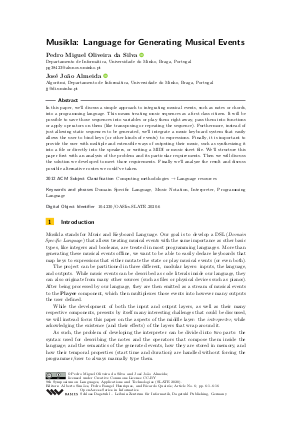Musikla: Language for Generating Musical Events
Authors
Pedro Miguel Oliveira da Silva  ,
José João Almeida
,
José João Almeida 
-
Part of:
Volume:
9th Symposium on Languages, Applications and Technologies (SLATE 2020)
Part of: Series: Open Access Series in Informatics (OASIcs)
Part of: Conference: Symposium on Languages, Applications and Technologies (SLATE) - License:
 Creative Commons Attribution 3.0 Unported license
Creative Commons Attribution 3.0 Unported license
- Publication Date: 2020-09-16
File

PDF
OASIcs.SLATE.2020.6.pdf
- Filesize: 0.55 MB
- 16 pages
Document Identifiers
Subject Classification
ACM Subject Classification
- Computing methodologies → Language resources
Keywords
- Domain Specific Language
- Music Notation
- Interpreter
- Programming Language
Metrics
- Access Statistics
-
Total Accesses (updated on a weekly basis)
0PDF Downloads0Metadata Views
Abstract
In this paper, we'll discuss a simple approach to integrating musical events, such as notes or chords, into a programming language. This means treating music sequences as a first class citizen. It will be possible to save those sequences into variables or play them right away, pass them into functions or apply operators on them (like transposing or repeating the sequence). Furthermore, instead of just allowing static sequences to be generated, we'll integrate a music keyboard system that easily allows the user to bind keys (or other kinds of events) to expressions. Finally, it is important to provide the user with multiple and extensible ways of outputing their music, such as synthesizing it into a file or directly into the speakers, or writing a MIDI or music sheet file. We'll structure this paper first with an analysis of the problem and its particular requirements. Then we will discuss the solution we developed to meet those requirements. Finally we'll analyze the result and discuss possible alternative routes we could've taken.
Cite As Get BibTex
Pedro Miguel Oliveira da Silva and José João Almeida. Musikla: Language for Generating Musical Events. In 9th Symposium on Languages, Applications and Technologies (SLATE 2020). Open Access Series in Informatics (OASIcs), Volume 83, pp. 6:1-6:16, Schloss Dagstuhl – Leibniz-Zentrum für Informatik (2020)
https://doi.org/10.4230/OASIcs.SLATE.2020.6
BibTex
@InProceedings{dasilva_et_al:OASIcs.SLATE.2020.6,
author = {da Silva, Pedro Miguel Oliveira and Almeida, Jos\'{e} Jo\~{a}o},
title = {{Musikla: Language for Generating Musical Events}},
booktitle = {9th Symposium on Languages, Applications and Technologies (SLATE 2020)},
pages = {6:1--6:16},
series = {Open Access Series in Informatics (OASIcs)},
ISBN = {978-3-95977-165-8},
ISSN = {2190-6807},
year = {2020},
volume = {83},
editor = {Sim\~{o}es, Alberto and Henriques, Pedro Rangel and Queir\'{o}s, Ricardo},
publisher = {Schloss Dagstuhl -- Leibniz-Zentrum f{\"u}r Informatik},
address = {Dagstuhl, Germany},
URL = {https://drops.dagstuhl.de/entities/document/10.4230/OASIcs.SLATE.2020.6},
URN = {urn:nbn:de:0030-drops-130194},
doi = {10.4230/OASIcs.SLATE.2020.6},
annote = {Keywords: Domain Specific Language, Music Notation, Interpreter, Programming Language}
}
Author Details
References
- Sam Aaron. Sonic pi – performance in education, technology and art. International Journal of Performance Arts and Digital Media, 12(2):171-178, 2016. URL: https://doi.org/10.1080/14794713.2016.1227593.
-
Samuel Aaron, Dominic A. Orchard, and Alan F. Blackwell. Temporal semantics for a live coding language. In FARM '14, 2014.

- The abc music standard - the tune body, December 2011. URL: http://abcnotation.com/wiki/abc:standard:v2.1#the_tune_body.
- General midi 1 sound set. URL: https://www.midi.org/specifications-old/item/gm-level-1-sound-set.
-
Guido Gonzato. Making music with abc 2, 2019.

-
Gareth Loy. Musicians make a standard: the midi phenomenon. Computer Music Journal, 9:8-26, 1985.

- James McCartney. Rethinking the computer music language: Supercollider. Computer Music Journal, 26(4):61-68, 2002. URL: https://doi.org/10.1162/014892602320991383.
-
Bob Nystrom. Crafting interpreters, 2020.

- Yann Orlarey, Dominique Fober, and Stéphane Letz. FAUST : an Efficient Functional Approach to DSP Programming. In Editions DELATOUR FRANCE, editor, New Computational Paradigms for Computer Music, pages 65-96. HAL, 2009. URL: https://hal.archives-ouvertes.fr/hal-02159014.
- Pep 255 - simple generators. https://www.python.org/dev/peps/pep-0255/, May 2001.
- Quantization music. URL: https://en.wikipedia.org/wiki/Quantization_(music).
- Ge Wang, Perry R. Cook, and Spencer Salazar. Chuck: A strongly timed computer music language. Computer Music Journal, 39(4):10-29, 2015. URL: https://doi.org/10.1162/COMJ_a_00324.
